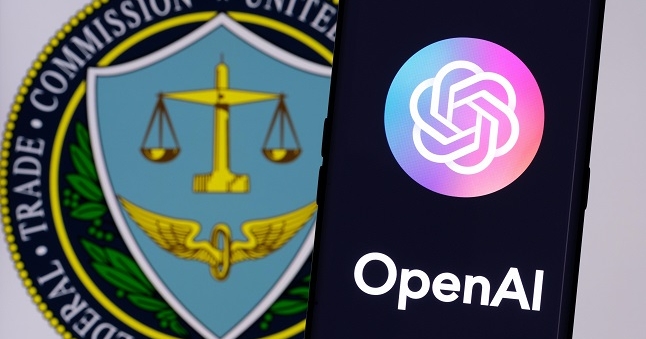OpenAI's ChatGPT: An FTC Investigation And The Future Of AI

Table of Contents
The FTC Investigation: What are the Concerns?
The Federal Trade Commission (FTC) investigation into OpenAI centers around several key concerns related to the ethical and legal implications of deploying a powerful AI model like ChatGPT. These concerns encompass critical areas impacting user rights and societal well-being.
Data Privacy Concerns
ChatGPT's data collection practices are a significant point of contention in the FTC investigation. The model's training relies on vast datasets scraped from the internet, raising concerns about unauthorized data collection and potential violations of privacy laws. Many users are unaware of the extent to which their data is being used to train and improve the model.
- Unauthorized data scraping: The process of gathering data from the internet often occurs without explicit consent from the original creators or individuals whose data is included.
- Insufficient user consent for data usage: Even when users interact with ChatGPT, the level of consent regarding data usage may not be adequately explained or obtained.
- Lack of transparency regarding data handling: The precise methods used to collect, process, and store user data often lack transparency, making it difficult for users to understand how their information is being used. This opacity fuels concerns about potential misuse.
Misinformation and the Spread of False Information
ChatGPT's ability to generate convincing text, even when factually incorrect, raises serious concerns about the potential for misinformation. The model can be used to create convincing fake news articles, propaganda, and other forms of false information that can be easily disseminated online.
- Generation of fake news and propaganda: The ease with which ChatGPT can produce realistic-sounding but entirely fabricated content poses a significant threat to the integrity of information online.
- Difficulty in distinguishing AI-generated content from real content: The sophistication of ChatGPT's output makes it difficult, even for experts, to reliably distinguish AI-generated content from human-created content. This ambiguity contributes to the problem's complexity.
- Potential for malicious use to spread misinformation: Malicious actors can leverage ChatGPT to generate and spread false information on a massive scale, potentially influencing public opinion and undermining trust in legitimate sources.
Algorithmic Bias and Fairness Issues
The data used to train ChatGPT inevitably reflects existing biases present in society. This means that the model can perpetuate and even amplify these biases in its outputs, leading to unfair or discriminatory outcomes.
- Gender, racial, and other biases reflected in ChatGPT responses: Studies have shown that ChatGPT exhibits biases related to gender, race, and other protected characteristics, often reflecting the biases present in the data used for its training.
- Impact on marginalized communities: These biases can disproportionately affect marginalized communities, reinforcing existing inequalities and perpetuating harmful stereotypes.
- Need for fairer and more inclusive AI models: Addressing these biases requires careful consideration of data selection, model design, and ongoing monitoring and evaluation of the model's outputs.
The Future of AI: Navigating the Regulatory Landscape
The FTC investigation into OpenAI and ChatGPT will have significant implications for the future of AI development and regulation.
Potential Outcomes of the FTC Investigation
The FTC investigation could result in several outcomes, including:
- Significant fines: OpenAI may face substantial fines for violating data privacy laws or engaging in unfair or deceptive practices.
- Changes to data practices: The FTC may require OpenAI to modify its data collection and handling practices to ensure greater transparency and user control.
- Increased regulation of AI: The investigation could trigger a wave of new regulations aimed at governing the development and deployment of AI systems, including chatbots. This could impact not just OpenAI but the entire AI industry.
The Need for Responsible AI Development
The development and deployment of AI systems, like ChatGPT, must prioritize ethical considerations. This includes:
- Transparency: AI systems should operate in a transparent manner, allowing users to understand how they function and what data is being used.
- Accountability: Mechanisms for accountability must be in place to address errors, biases, and other issues arising from AI systems.
- User control: Users should have greater control over their data and how it is used by AI systems.
The Role of Government Regulation in AI
The debate surrounding AI regulation is ongoing, with many different perspectives on the best approach. A balanced approach is needed that fosters innovation while mitigating potential risks:
- Clear guidelines and standards: Governments must develop clear guidelines and standards to govern the development and use of AI, focusing on data privacy, algorithmic bias, and misinformation.
- International cooperation: International cooperation is crucial to establish consistent standards for AI regulation, given the global reach of AI technologies.
- Adaptive regulation: The rapid pace of AI development requires a regulatory framework that is adaptable and capable of responding to emerging challenges.
Conclusion: The Future of ChatGPT and AI Regulation
The FTC investigation into OpenAI's ChatGPT is a watershed moment for the AI industry. The potential outcomes – substantial fines, changes to data practices, and increased regulatory scrutiny – underscore the urgency of addressing the ethical and legal challenges posed by powerful AI models. The need for responsible AI development, emphasizing transparency, accountability, and user control, cannot be overstated. We need a balanced approach to AI regulation that fosters innovation while mitigating risks. Stay informed about the evolving landscape of AI regulation and the impact on ChatGPT and other AI technologies. Understanding responsible AI development is crucial for a future where innovation and ethical considerations coexist. Promoting AI accountability and advocating for ChatGPT regulations that protect user rights are vital steps toward ensuring a future where AI benefits all of society.

Featured Posts
-
 Philips Future Health Index 2025 Urgent Call To Action On Ai In Healthcare
May 24, 2025
Philips Future Health Index 2025 Urgent Call To Action On Ai In Healthcare
May 24, 2025 -
 Best And Worst Days To Fly For Memorial Day Weekend 2025
May 24, 2025
Best And Worst Days To Fly For Memorial Day Weekend 2025
May 24, 2025 -
 Test Kak Khorosho Vy Znaete Roli Olega Basilashvili
May 24, 2025
Test Kak Khorosho Vy Znaete Roli Olega Basilashvili
May 24, 2025 -
 The Future Of Family Planning Examining The Role Of Over The Counter Birth Control After Roe V Wade
May 24, 2025
The Future Of Family Planning Examining The Role Of Over The Counter Birth Control After Roe V Wade
May 24, 2025 -
 French Cac 40 Index Mixed Performance For The Week Ending March 7 2025
May 24, 2025
French Cac 40 Index Mixed Performance For The Week Ending March 7 2025
May 24, 2025
Latest Posts
-
 Increased Living Costs Lead To Reduced Auto Theft Prevention In Canada
May 24, 2025
Increased Living Costs Lead To Reduced Auto Theft Prevention In Canada
May 24, 2025 -
 Ask Kapida Mayis Ayinda Romantik Bir Doeneme Girecek 3 Burc
May 24, 2025
Ask Kapida Mayis Ayinda Romantik Bir Doeneme Girecek 3 Burc
May 24, 2025 -
 16 Mart Hangi Burc Burc Oezellikleri Ve Daha Fazlasi
May 24, 2025
16 Mart Hangi Burc Burc Oezellikleri Ve Daha Fazlasi
May 24, 2025 -
 Mayis Ayinda Ask Yasamaya En Hazir 3 Burc
May 24, 2025
Mayis Ayinda Ask Yasamaya En Hazir 3 Burc
May 24, 2025 -
 Mz
May 24, 2025
Mz
May 24, 2025
